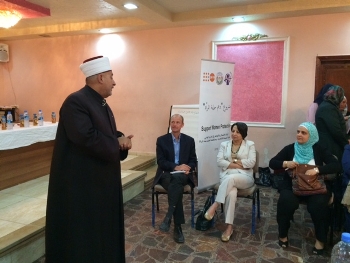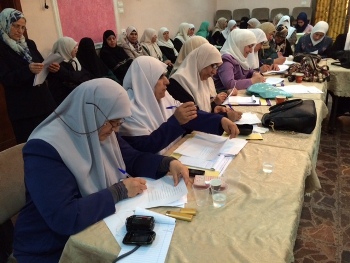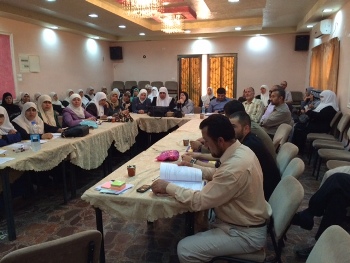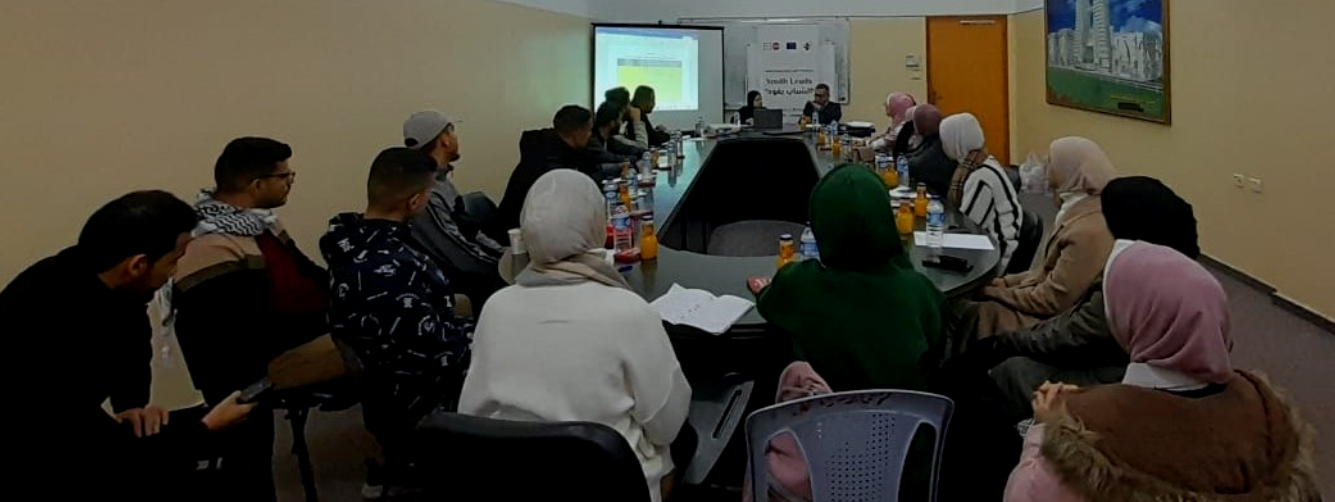
Ramallah – This was all new to Maysaloun Abu Hassan, a female preacher from Jenin. Learning about tools of communication regarding reproductive health and combatting violence against women was entirely new territory. But she was eager to listen during the training conducted by MIFTAH in cooperation with the Ministry of Waqf and Religious Affairs as part of the “Support for the Protection of Women” program. The program is being carried out in partnership with UNFPA. Two training sessions were held over the course of three days in Jenin and Tulkarem districts. The number of participants in the two training courses totaled 46 religious leaders, mainly Imams and Preachers, both males and females.
Maysaloun Abu Hassan: dormant ideas were awakened
Maysaloun said the training enhanced her abilities as a preacher because of the information she received, which she said she was able to put into action in her line of work and in her contact with so many women. However, the biggest impact, she says, was how the training affected her at home, in her relationship with her husband and children.
“We learned new methods which we did not realize before,” she says. “The training prompted us to think about our lives. I, as well as those with me, felt like dormant thoughts were awakened inside of us. This opened doors that were previously closed. The trainer [Thoqan Qishawi] is highly qualified and knew how to get the message across.”
Ahmad Saad: Today we are more qualified and capable
Ahmad Saad, one of the Imams who participated in the training, shared Maysaloun’s sentiments. He said the training was comprehensive, with clear ideas put forth. “The ideas were real and supported by evidence; this was not just theoretical material,” he says. Saad maintains that while he has been an imam for a long time, he feels he is now more qualified and capable of carrying out his duties and does not hesitate to share his knowledge with his fellow Preachers and Imams.
Both Ahmad Saad and Maysaloun Abu Hassan showed their appreciation for MIFTAH and the Ministry of Waqf and Religious Affairs, and expressed their hope that they would be offered more training of a similar nature in the future.
Thoqan Qishawi: A turning point in discourse and in thoughts
Trainer and capacity-building expert Thoqan Qishawi stressed on the importance of the training in terms of its important beneficiaries. Since the training addressed two main issues – communication and gender-based violence – it constituted a turning point in discourse and in the way of thinking among many participants.
Qishawi goes on to explain how he assesses the training results: “the evaluation encompasses four levels: the first was the level of satisfaction among the trainees, the material, trainer performance and the training methodology and approach. The second was the level of learning; they were at a high level of learning. They had lots of questions so therefore it was a qualitative experience for them. The third point focused on the level of application and the perception of the Imams and Preachers.” Finally, Qishawi says there is a fourth level of assessment, which pertains to awareness transformation. “At this level, we achieved important results, especially in terms of acquiring skills in communication.”
Qishawi said the next step will revolve around how this training will reflect on their performance as Preachers and Imams and how their discourse will rise to the level of inclusion of others.
On her part, trainer Hanan Abu Ghosh spoke about the concept of reproductive health and the importance of including men, saying this is a priority of health institutions, to promote ways of obtaining quality reproductive health services and to expand the scope of opportunities for men and women to enjoy a healthy way of life.
Deputy Minister of Waqf: We achieved what we did not achieve in the past
It was equally important that The Deputy Minister of Waqf, Sheikh Khamis Abdeh attended part of the training along with UNFPA Special Representative, Anders Thomsen, and MIFTAH CEO Dr. Lily Feidy.
“It is imperative that there is mutual awareness about reproductive health among males and females given that raising Palestinian children is a joint affair between spouses”, said Sheikh Abdeh. “What we did not achieve in the past, we are achieving now through MIFTAH and UNFPA.”
Abdeh urged female Preachers and Imams to ensure they had correct and accurate information, which he said was power.
Abdeh stressed the importance of benefiting from this project, which is implemented by MIFTAH, and said: "We must take advantage of this intervention and use it, and not just stand as listeners".
Dr. Lily Feidy: Rectifying misconceptions
Dr. Feidy thanked the deputy Minister of Waqf for participating in the workshop, saying she was "very pleased with this partnership between civil society institutions and the Ministry.” She also thanked UNFPA for their long-term partnership.
Dr. Feidy addressed the Imams and Preachers, saying: “Your role is very important and you bear a huge responsibility in raising awareness in society and in rectifying the misconceptions out there". She said this was a "national duty we must all seek to fulfil”, expressing her hope that this experience with the Ministry of Waqf would lead to other long-term initiatives.
UNFPA representative, Anders Thomsen also thanked MIFTAH and the Ministry of Waqf, saying UNFPA was happy to work with MIFTAH and build this partnership with the organization, “so we can promote this awareness and transform it to others”, he said.
To the audience Thomsen said: “Thank you, as leaders in Palestinian society, thank you for your interest in this subject and your courage to reach out to your communities and speak about these important topics.” He ended by saying that, “the goal of our projects is to create a strong, open and giving Palestine.”
Hanan Said: promoting awareness on reproductive health rights
MIFTAH project coordinator Hanan Said, said the goal of the training was to promote awareness among Imams and Preachers on reproductive health rights and on combatting violence against women so that the information gained would eventually be used in religious discourse in their own communities. “Since Imams and Preachers have such an impact and ability to create change through their religious lessons and sermons, the training will contribute to raising societal awareness on the importance of reproductive health rights and combatting gender-based violence,” Said maintained.









